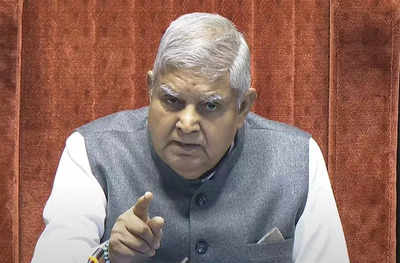
Bhopal:
Vice-President Jagdeep Dhankhar
on Friday asked how the Chief Justice of India could get involved in executive appointments, and said it was time to "revisit" such norms.
"How can, in a country like ours or in any democracy, by statutory prescription, Chief Justice of India participate in the selection of the CBI director! Can there be any legal rationale for it? I can appreciate that the statutory prescription took shape because the executive of the day has yielded to a judicial verdict. But time has come to revisit. This surely does not merge with democracy. How can we involve CJI with any executive appointment," Dhankhar said at National Judicial Academy at Bhopal, according to a press statement by the Vice-President's secretariat.
Expressing concern over breach of the principle of
separation of powers
, Dhankhar said, "
Executive governance
by judicial decree is a Constitutional paradox that the largest democracy on the planet cannot afford any longer. When institutions forget their bounds, democracy is remembered by the wounds this forgetfulness imparts. A concert of chaos was never in the contemplation of the founding fathers of the Constitution. Constitutional consultation without institutional coordination is mere constitutional tokenism."
Jurisdictional deference requires that these institutions operate within defined constitutional bounds while maintaining cooperative dialogue, keeping national interest in mind, the Vice-President said.
"Accountability is enforceable when executive roles are performed by elected govt. Govts are accountable to legislature, and periodically accountable to the electorate. But if executive governance is arrogated or outsourced, enforceability of accountability will not be there. Exclusively, governance lies with the government. With utmost respect, any intervention from any source, in the country or outside, from legislature or judiciary, is antithetical to constitutionalism and certainly not in consonance as with the fundamental premise of democracy," he said.
"Democracy thrives not on institutional isolation but in coordinated autonomy. Indisputably, institutions contribute productively and optimally while working in their respective domains. Out of deference, I will not advert to instances except to observe that executive governance by judiciary is being frequently noticed and discussed nearly in all quarters," he remarked.
Judicial review
is a "good thing" as it ensures that laws conform to the Constitution, Dhankhar said. However, when it comes to amending the Constitution, Parliament is the ultimate authority, he asserted.
"The judiciary's public presence must be primarily through judgments. Judgments speak for themselves… Any other mode of expression other than through judgments avoidably undermines institutional dignity," he said, adding: "I seek revisitation of the present state of affairs so that we get back to the groove, a groove that can give sublimity to our judiciary. When we look around the globe, we never find judges reflecting the way we see here on all issues."
Recalling his stint as parliamentary affairs minister in 1990, Dhankhar said the Supreme Court then had eight judges, and "more often than not, all eight judges sat together". "Please note, when this strength was eight, it (the size of constitutional bench) was five. The Constitution allows the highest court of the land to interpret the Constitution," he said, adding: "But in the guise of interpretation, there can be no arrogation of authority."
The essence and spirit which the founding fathers had in mind under Article 145(3) must be respected, the V-P said. Article 145(3) says that at least five judges are required to sit on a case involving the interpretation of the Constitution.
Referring to a book by former solicitor general Andhya Arjuna, the Vice-President said: "Having read it, my view is that the doctrine of the basic structure of the Constitution has a debatable, very debatable, jurisprudential basis."
Underlining the importance of dialogue, he said, "You must have the right to express. If that right is compromised, or throttled, or diluted, democracy gets thinner and thinner. It is your right of expression that makes you the most important factor in democracy, stakeholder. One facet of expression is the right to vote. But more important is to express your views, your point of view."
"You participate in governance, administration by having a voice of expression. And this expression is not standalone. It requires dialogue. Expression without dialogue means my way or no way… A difference of opinion must ignite an urge in us to converse to find a common ground. And sometimes yielding is a better part of discretion," he said.
"Is there a matter in judicial domain which lies exclusively with the magistrate or a district judge or high court not being dealt by Supreme Court? Structure of the Constitution is very categorical. Judicial governance is left to the high courts in their areas," the Vice-President said.
"All subordinate courts and tribunals in the jurisdictional area of the high court are subject to HC's control but there is no similar control of Supreme Court either of high courts or subordinate judiciary," he added.
.png)
 German (DE)
German (DE)  English (US)
English (US)  Spanish (ES)
Spanish (ES)  French (FR)
French (FR)  Hindi (IN)
Hindi (IN)  Italian (IT)
Italian (IT)  Russian (RU)
Russian (RU)  1 week ago
6
1 week ago
6









Comments